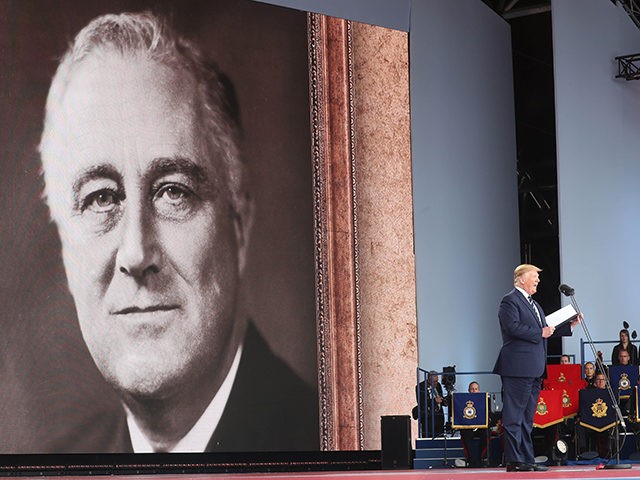The president of the Foundation for Defense of Democracies has added his voice to the praise heaped upon President Trump’s powerful D-Day speech, noting its important stand against “transnational progressivism.”
In his D-Day remarks delivered in Normandy last Thursday, Mr. Trump did not shy away from language of right and wrong, good and evil, noting that the American soldiers “enlisted their lives in a Great Crusade” and their mission is the story of “the ferocious, eternal struggle between good and evil.”
Speaking with host Paul Gigot on Fox News WSJ roundtable Saturday, Cliff May of the Foundation for Defense of Democracies said that Trump’s speech was “iconoclastic and transgressive.”
One of the highlights, May noted, was “a very persuasive, gentle defense of nationalism,” by underscoring “the idea of independent and sovereign states that come together in alliance to defeat common enemies, but they are still self-ruling.”
“This was subtly an argument against globalism, and against the sort of neoconservative idea of a liberal rules-based order,” May added. “He was giving a very different idea at a time when in a lot of the media and a lot of political discourse nationalism is said to be akin to fascism.”
“Emmanuel Macron has said nationalism is the opposite of patriotism. [Trump] was saying no it isn’t,” he said.
In his speech, Trump described the naval armada of allies as “the citizens of free and independent nations, united by their duty to their compatriots and to millions yet unborn.”
These were not representatives of vague, abstract, supranational entities, but real citizens with real national homelands, Trump insisted.
They were “the British,” “the Canadians,” “the fighting Poles,” “the tough Norwegians,” “the intrepid Aussies,” and “the gallant French commandos,” Trump said, along with the Americans, who “had come to offer their lives half a world from home.”
The Trump speech was in fact “an attack on transnational progressivism,” May said. “This whole idea that the U.N. – whether the UN General Assembly, which is a collection largely of dictators, or the U.N. Security Council, which has Russia and China neither of which are liberalizing – that they make the rules and those rules have to be obeyed not least by us.”
“More powerful than the strength of American arms was the strength of American hearts,” the President said in his speech.
“These men ran through the fires of hell moved by a force no weapon could destroy: the fierce patriotism of a free, proud, and sovereign people. They battled not for control and domination, but for liberty, democracy, and self-rule,” he said.
“They pressed on for love in home and country — the Main Streets, the schoolyards, the churches and neighbors, the families and communities that gave us men such as these,” he said.

COMMENTS
Please let us know if you're having issues with commenting.